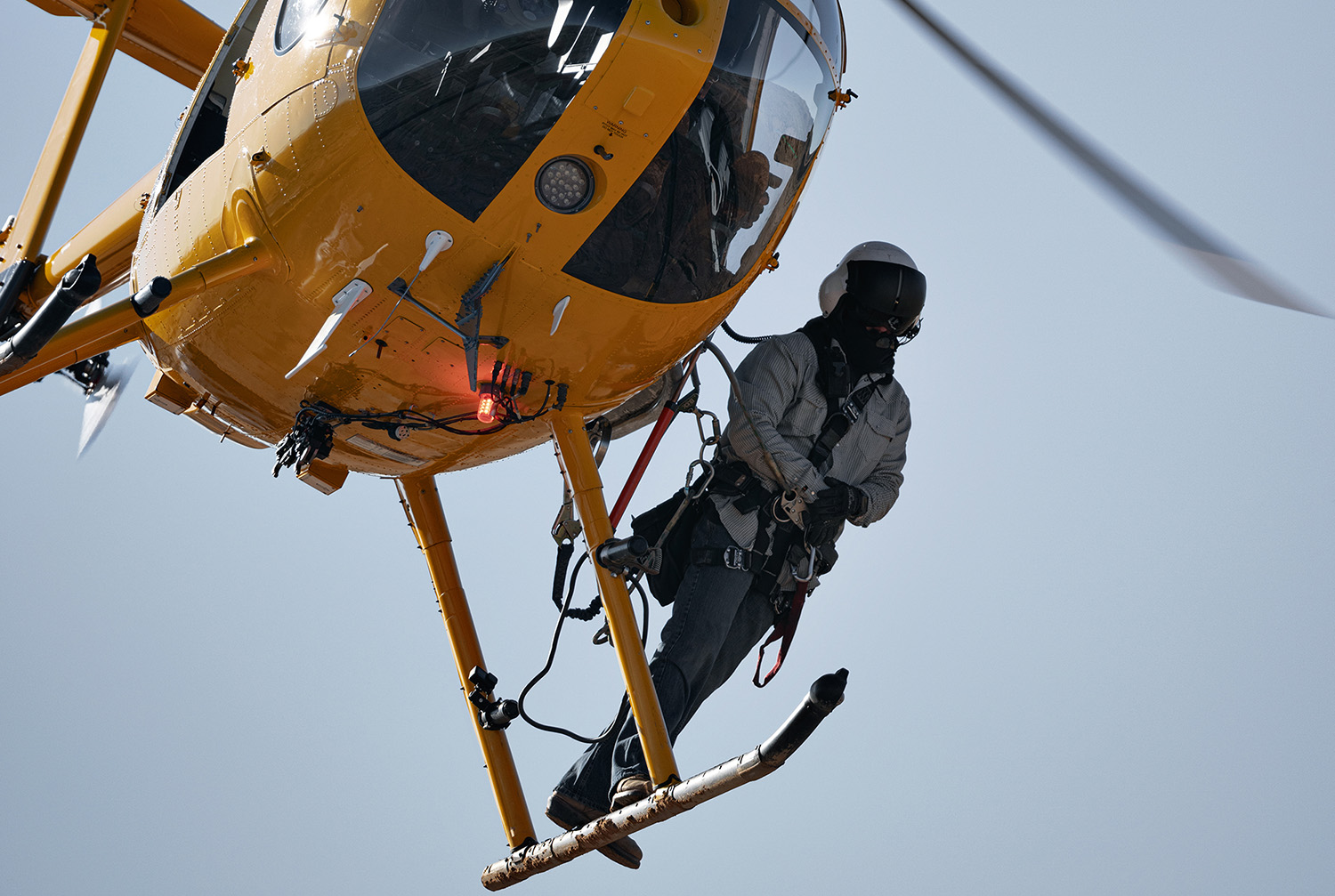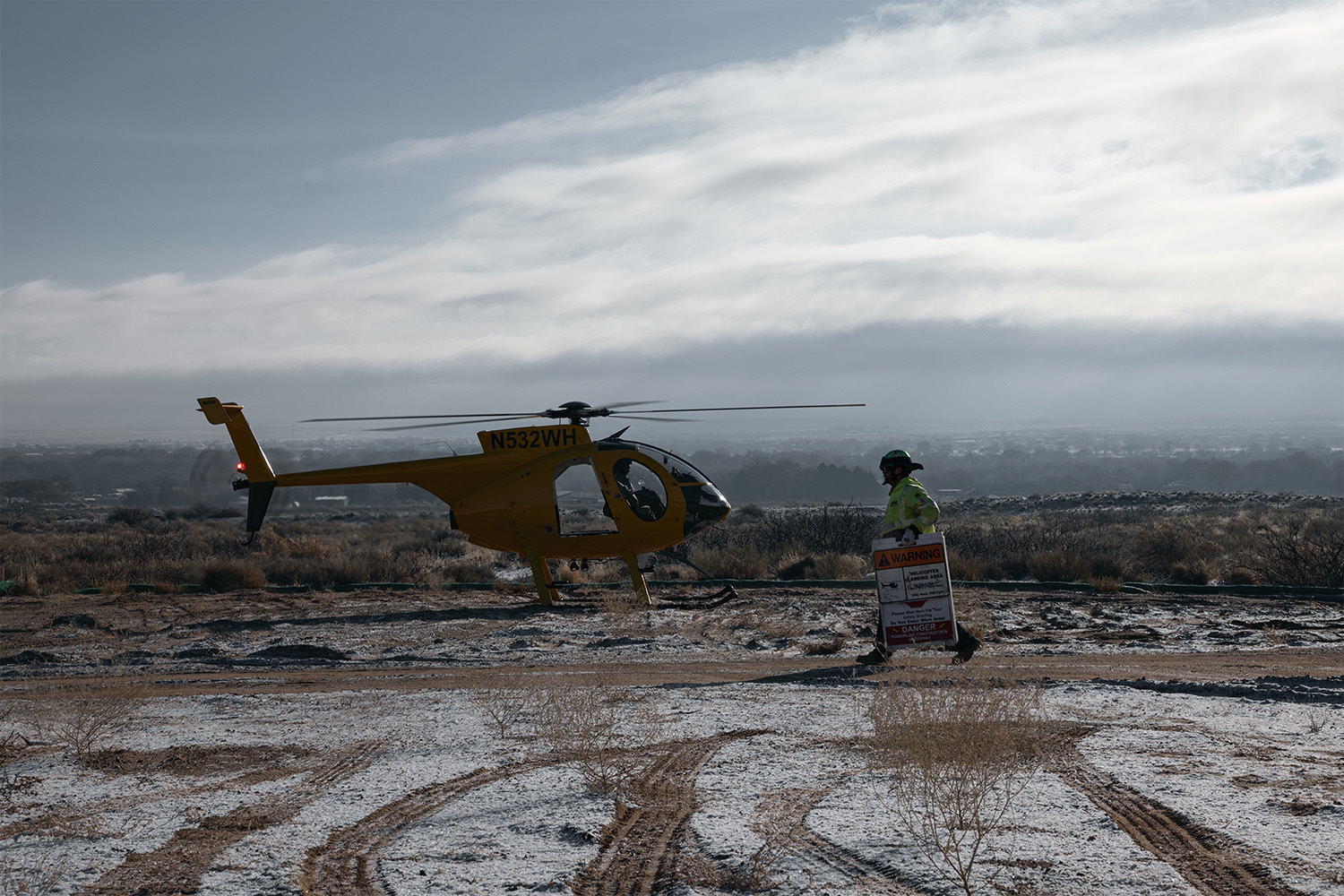

Higher Ground
Across the United States, new structures are being built every day, and these structures need electricity. From coast to coast, electric transmission lines are being constructed and maintained—even in the most remote places with treacherous landscapes. Faced with a multitude of challenges from aggressive project schedules to terrain with limited access, aerial helicopter linemen are the dedicated men and women putting their lives on the line to brave heights, maintain and construct large scale electrical towers, and keep America running.


Winco Powerline Services
Based just south of Portland, Oregon at the Aurora State Airport, Winco Powerline Services operates a fleet
of ten MD500 series helicopters to provide specialized services to the utility industry and construction and maintenance contractors. Operating since 1992, the team at Winco has worked on projects throughout the country from the Pacific Northwest to Pennsylvania. We recently got a chance to sit down with Winco helicopter pilot Jason Lowry, superintendent Marc Poulin, and journeyman lineman Devon Pontine to learn more about the difficult and important work they
do every day.












Jason Lowry,
Winco Helicopter Utility Pilot
Boot Barn Work: How long have you been flying and how did you become a helicopter pilot?
Jason: I’ve been flying for 15 years. I was previously a journeyman carpenter. One day, I was working on a building, and I saw a helicopter set some air conditioning units on the building next to me, and just realized I was doing the wrong thing for a living. I had never seen a helicopter used that way. I took a demonstration flight and could hover the helicopter in the first hour. The instructor told me everything, how to do it as a profession. 11 months later I was the instructor and was teaching people how to fly.
Boot Barn Work: How do you and other crew members handle being on the job for two to three months at a time?
Jason: It can be a challenge. We all lean on each other. We're always watching out for each other because we can't have somebody out there that has a lot going on at home and not speaking up about it. The work is dangerous and difficult. We have to be able to manage that all the time. We're all about raising our hands. If one of us needs to go home... family is first, and part of that is doing things safely.
Boot Barn Work: Can you talk about the skills it takes to fly, land on the same spot, and keep things steady? Are you working on these skills constantly?
Jason: It’s something that I've always focused on. I’m not one of those, "It's good enough" type of guys. People used to ask me, "Why are you always trying to land on that same spot?" And I’d say, "Because one day it's going to be important." We land in a lot of new places and there's a lot of moving pieces around us, pieces of equipment coming in. Towers will change. If you try to be as precise as you can consistently, your brain is always keyed in and you're less likely to make a mistake.
Boot Barn Work: You're doing a dangerous job and your crew relies on you to get them from point A to point B. Have there been times with dangerous situations and how did you respond?
Jason: Oh, certainly. Especially on repair jobs or when we get into storm work. So, that's where having an order of steps to how we approach the job is vital and important. The guys know I'm going to approach things the same way, and I know they're going to approach things the same way. Then we can double-check each other and make sure the work comes out the way it's supposed to, and that everybody gets off the tower safely and back to the landing area. When things don’t go right, we'll just stop and have a conversation about it, regroup, and then figure out how we're going to attack it again and then get back at it.




Marc Poulin, Director
of Line Operations
Boot Barn Work: How long were you a lineman before you became a superintendent and how did you get to be in this line of work?
Marc: I was a lineman for 11 years. In college, I saw a video during an OSHA class of a guy transferring from a helicopter onto an energized power line. That made me want to go try it. I was told it was going to be at least an eight-year process. But step one, would be go to a line school or an apprenticeship. So that's what I did. I signed up for line school the next fall.
Boot Barn Work: What are the safety checks before a job? What is the process that you go through before the work starts and you're up in the air?
Marc: We start every day going over the potential hazards for each task that we're going to do that day. Then after that's complete, the guys will put their harnesses on and double check that everything's hooked up correctly. You check over whoever you're flying with and make sure they're hooked up correctly. We inspect all our rigging and tooling. They'll make sure all the slings and hoists are in good working order and that they're rated for what they're going to be doing that day. Then, you’re constantly checking while you're up there working. You double check the structures, make sure there's no bolts missing. You're constantly looking and watching for things.
Boot Barn Work: How does the country benefit from the work you and your crew do?
Marc: We get a lot of ground covered in a short amount of time with typically less people than it would take for a traditional ground contractor. There is also the environmental impact. A traditional ground contract has to bulldoze roads to structures. We're able to go from one location to a couple of miles in each direction with just one impact zone.
Boot Barn Work: What are some of your most memorable moments of being a lineman superintendent?
Marc: One of my favorite things is the relationships and friendships I built with the people I’ve worked with ever since I've started. You build bonds that you can't replace. You miss out on home time, but you build a new home and a new family with the guys and people you're working with.








Devon Pontine,
Journeyman Lineman
Boot Barn Work: How long have you been a journeyman lineman?
Devon: A typical apprenticeship like I went through is about three and a half years. I've been doing this since I was 18, so I'm almost nine years into it. There’s a lot to learn in the safety aspects that's going to keep you and the guy next to you alive. You don't want to be the person that the apprentices you're teaching can't look to for answers.
Boot Barn Work: What goes through your mind on a day-to-day basis to keep people safe?
Devon: I think we all have equal pressure on us. We look at everybody on the crew as family. We care about each other and want to make sure everybody goes home at the end of the day. It's a shared effort to make sure that everybody is safe. And if somebody's not 100% one day, you're taking up the slack for that person. You want to always be sure to watch the guy next to you and watch what you're doing because everything we do out here is dangerous. It's all about the training and everybody on the crew being confident and responsible for not only their actions, but also everybody else's.
Boot Barn Work: What is it like being an aerial lineman?
Devon: When that harness goes on, the mindset changes, the jokes stop. You get picked up and everything in your mind just disappears. It’s freeing because you get picked up, you get to watch the earth below you move, you feel the wind on your face, and you know you're right where you're supposed to be. You're going to do a job that you're needed for.
Boot Barn Work: How do you feel the country benefits from the work that you and your crew do?
Devon: We do a lot of transmission work. Transmission lines connect your substations and bring electricity from the power generation plants. Without transmission lines and what we do, your lights wouldn't turn on.


